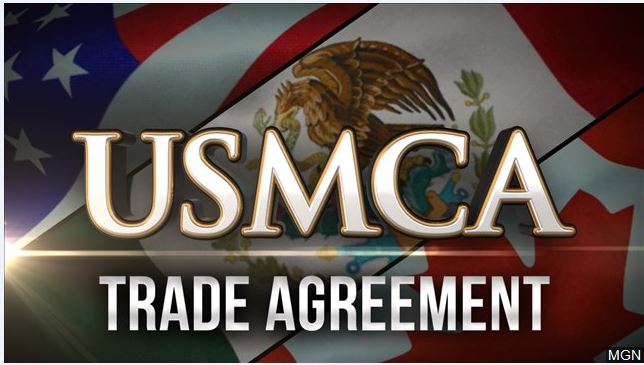
July 1, 2020 Update:
The USCMA has officially gone into effect on July 1st, 2020.
June 2, 2020 Update:
The Office of the US Trade Representative (USTR) published an interim version of the Uniform Regulations concerning the interpretation, application, and administration of key provisions of the US-Mexico-Canada Agreement (USMCA), including the Agreement’s rules of origin for automotive goods.
As many people know the Trump administration has been vocal about how much they hated the NAFTA deal. The United States came up with a completely new deal, instead of re-working NAFTA. Just before the midnight deadline on Sunday, the US and Canada agreed on a deal for USMCA or United States Mexico Canada Agreement. All three countries have been said to be celebrating this new deal that calls for equality in trade for each country. Mexican President Enrique Peña Nieto called it a “win-win-win agreement.” Canadian Prime Minister Justin Trudeau said North American trade had been “preserved and modernized for the 21st century.” US President Trump also said “the most important trade deal we’ve ever made, by far” about his own deal.
TN Visas Under USMCA
It doesn’t look like the new USMCA trade deal will change anything with regard to the TN visas. Please see below from the CBC and Toronto Star, respectively:
CBC:
“No new professionals visas. Another goal of Canada’s negotiating team was to modernize the list of professions currently eligible for the special class of temporary work visas created under NAFTA known as TN (Trade National) visas. It appears that list isn’t changing and no commitments have been made to increase the number of TN visas issued by the United States, or to otherwise make it easier for citizens to work across North American borders.”
Toronto Star:
“There were no changes related to “TN” visas for professional workers. Canada had wanted the list of eligible occupations expanded, while the U.S. had wanted it reduced; they settled on leaving it the same.”
This is great news for those who want to work between country lines such as businessmen and businesswomen, entrepreneurs, truck drivers, salesmen, bloggers, travelers, etc. TN Visas through NAFTA has been extremely popular which should continue its popularity through the USMCA.
What Is USMCA and How Is It Different From NAFTA?
Although USMCA is a completely new name, it isn’t exactly a “brand new deal” as President Trump has described it. Vox online said this about the deal: “It’s basically NAFTA 2.0: an updated version of the nearly 25-year-old trade agreement, with major changes on cars and new policies on labor and environmental standards, intellectual property protections, and some digital trade provisions.”
There are several major changes in the USMCA compared to NAFTA. (the following data has been provided by USA Today)
Higher pay for auto workers
Starting in 2020, 30 percent of vehicle production must be done by workers earning an average production wage of at least $16 per hour. That’s about three times the pay of the average Mexican autoworker. In 2023, the production percentage rises to 40 percent. This could result in job production moving from Mexico to the U.S.
More auto parts from member nations
Automakers can qualify for zero tariffs if 75 percent of their vehicles’ components are manufactured in the U.S., Canada or Mexico, up from 62.5 percent under NAFTA. Seventy percent of the steel and aluminum used in vehicles will have to come from the U.S., Canada or Mexico.
Canada loosens dairy restrictions
Canada will ease restrictions on its dairy market and allow American farmers to export about $560 million worth of dairy products. That’s about 3.5 percent of Canada’s total $16 billion dairy industry.
Dispute process unchanged
Trade disputes will continue to be decided by a panel of representatives from all three nations.
Tariffs stay in place
U.S. tariffs of 25 percent on steel and 10 percent on aluminum from Canada and Mexico remain in effect as negotiations continue. If the U.S. imposes new auto tariffs, Mexico and Canada would be able to export up to 2.6 million passenger vehicles to the U.S. annually without any tariffs. Exports above that amount could be subject to tariffs. Pickup trucks built in both countries would be completely exempt from the tariffs.
Intellectual property rules stiffened
For first time, law enforcement officials can stop suspected counterfeit or pirated goods in any of the three countries. Harsher punishments will be added for pirated movies online and civil/criminal penalties for satellite/cable signal theft. The pact includes a slew of new rules for “strong and effective protection and enforcement of intellectual property rights.”
SOURCE Office of the U.S. Trade Representative; Associated Press; Reuters; Bloomberg; USA TODAY research
When Will USMCA Be in Affect?
The three leaders are preparing to sign the USMCA before the end of November — possibly at the G20 summit in Buenos Aires, Argentina. But all three countries must still ratify it. In the meantime, debates in Canada, Mexico, and the US will play out over the following months about whether these revisions are wins or losses — and whether this new trade agreement is a real improvement on what came before.
Do You Want To Work in the United States?
If so, Contact VisaPlace today. All our cases are handled by competent and experienced immigration professionals who are affiliated with VisaPlace. These professionals consist of lawyers, licensed paralegals and consultants who work for Niren and Associates an award winning immigration firm that adheres to the highest standards of client service.
Ready for the next step? Book your 1 on 1 consultation now or call us at 1-877-296-0874.
Have a Question related to your Immigration Needs?
Click here to fill out the FREE Immigration Assessment form below and get a response within 24 hours to see if you’re eligible.
The assessment form should take approximately 5-7 minutes to complete. We will get back to you within one business day to let you know if we are able to help.






